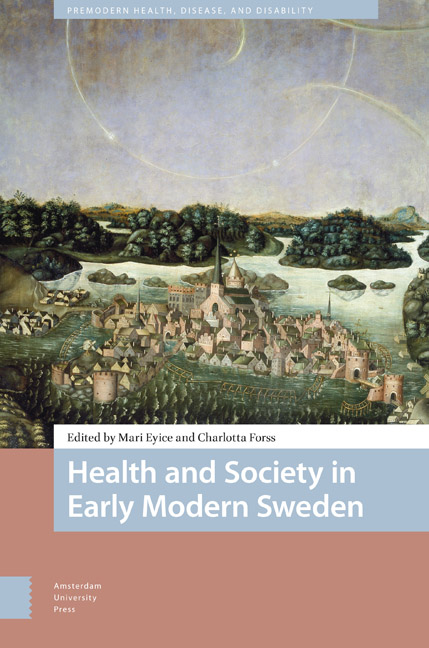Book contents
- Frontmatter
- Contents
- List of Tables and Figures
- Acknowledgements
- 1 Meanings of Health in Early Modern Sweden
- 2 Illness as Incapacity to Work in Early Modern Sweden
- 3 The Body in the Bathhouse: Health and Bathing in Early Modern Sweden
- 4 ‘Somewhat Heated, Quick and Lively’ : Humoral Explanations of the Learning Difficulties of Charles XI of Sweden (1655–1697)
- 5 Health in Body and Soul in a Female Birgittine Convent 1516–1522
- 6 Curing Madness and Mental Disturbances : Religious Healing Activities in Early Modern Swedish Local Communities
- 7 Not Quacks but Close : Reappraising the Role of Physicians on the Eighteenth-Century Medical Market
- 8 Gender, Health, and Hair in Sweden, 1740–1840
- 9 Gender Norms and Early Modern Healthcare : Barber-Surgeons in Sweden c. 1600–1900
- Epilogue : Epistemologies of Body and Soul: Considering the Early Modern and (Late) Modern History of Health
- Index
Epilogue : Epistemologies of Body and Soul: Considering the Early Modern and (Late) Modern History of Health
Published online by Cambridge University Press: 16 April 2024
- Frontmatter
- Contents
- List of Tables and Figures
- Acknowledgements
- 1 Meanings of Health in Early Modern Sweden
- 2 Illness as Incapacity to Work in Early Modern Sweden
- 3 The Body in the Bathhouse: Health and Bathing in Early Modern Sweden
- 4 ‘Somewhat Heated, Quick and Lively’ : Humoral Explanations of the Learning Difficulties of Charles XI of Sweden (1655–1697)
- 5 Health in Body and Soul in a Female Birgittine Convent 1516–1522
- 6 Curing Madness and Mental Disturbances : Religious Healing Activities in Early Modern Swedish Local Communities
- 7 Not Quacks but Close : Reappraising the Role of Physicians on the Eighteenth-Century Medical Market
- 8 Gender, Health, and Hair in Sweden, 1740–1840
- 9 Gender Norms and Early Modern Healthcare : Barber-Surgeons in Sweden c. 1600–1900
- Epilogue : Epistemologies of Body and Soul: Considering the Early Modern and (Late) Modern History of Health
- Index
Summary
Abstract
The chapters of this volume demonstrate the protracted coexistence in the early modern era of a wide variety of medical knowledge regimes and practices for interpreting health and combating illness. In contrast, the modern medical paradigm, which consolidated its hegemonic authority in the first half of the twentieth century, understood health as primarily a concern of medical science and of the public sphere. However, the latter decades of the twentieth century saw a reemergence of alternative epistemologies and the growth of a multifaceted health market. The epilogue discusses comparisons, analogies, and contrasts between this era of ‘late modernity’ and the early modern era. Three main topics are discussed: the return of holistic new spirituality; the ideology of ‘healthism’ and the marketisation of health; and the emergence of fitness culture.
Keywords: health, healthism, fitness culture, alternative medicine, twenty-first century
Introduction
Today, as in the early modern era, great value is placed on the possession of health. This volume has uncovered health as a signifier of the good life in early modern society, understood in terms of happiness, tranquility, virtue, and prosperity. In this commentary chapter, I will move the discussion closer to our present time, focusing on the era from c. 1970 up until ‘today,’ sometimes referred to as ‘late modernity.’ How can the high premium placed on achieving and maintaining health today be understood from the historian's perspective? Can health and wellness ‘of body and soul’ be likened – as has sometimes been suggested – to a secular religion, manifesting the virtuous (Swe. dygdigt) life, with places like the gym, the yoga studio, or the running track as temples of worship? Reflecting on the historically contingent nature of health, I will discuss the comparisons, analogies, and contrasts between the early modern and the late modern eras.
The chapters of this volume have demonstrated a great variance regarding the meaning and significance of ‘health,’ how it has been interpreted and imagined to be achieved and maintained. They have delineated the breadth of definitions of health, including mental, spiritual, and emotional dimensions, in the early modern era. Hence, this volume underlines the importance of historising and contextualising the conceptions and practices of health and illness as integrated in social relations, institutions, and the everyday lives of people from all social standings.
- Type
- Chapter
- Information
- Health and Society in Early Modern Sweden , pp. 225 - 238Publisher: Amsterdam University PressPrint publication year: 2024



